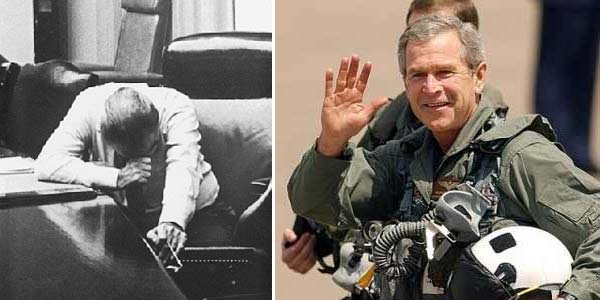In the previous article I explained that the political commentators on both sides of the Trump-Erdoğan polemics are trying to make comparisons between two political figures (and their related political movements) that are simply not comparable. Their error is mutual — to assume that the political reality in their own society is applicable to that of the opposite country.
In the end, I have no sympathy for the anti-AKP crowd in both societies that have been gnashing their teeth since November, claiming that Trump is the Second Coming of Erdoğan. That’s actually a compliment for Trump that he doesn’t deserve — Erdoğan, love him or hate him, has decades of political experience, and has led Turkey to greater economic prosperity and a heightened international profile over the past fifteen years. Trump? Even the first three weeks of his presidency have been an unmitigated disaster. Trump’s learning curve will have to be steep in order to rescue his administration from what now looks like enduring infamy. In fact, indications are that Trump has already realized that being president is “hard” (1). That’s a start!
But such shallow attitudes are typical for Erdoğan’s opponents, so there’s not much to discuss on that topic. It’s the pro-Erdoğan side which, in this case, is making the same mistake that the AKP’s opponents have been making for the past fifteen years. On the one hand, I can understand the Erdoğan fans who hopped on the pro-Trump bandwagon out of spite for the previous U.S. administration’s mistaken foreign policies. But on the other hand, it is not possible to feel sympathy for their new-found crush. Schadenfreude is always nasty, and is leading them into a political trap. How many anti-Muslim actions from Trump or his advisors will it take before they repent of their infatuation (2)? Will Trump’s threatened ban on Muslim immigration be the final straw, or his project for a national Muslim registry? What action or statement from Trump would finally disabuse these people of their pretended admiration for a man who openly displays racist, xenophobic, misogynist, and chauvinistic attitudes, and who has appointed a cabinet full of America’s ultra-elites who are about as far a remove from the common people as possible?
In fact, after Trump’s impulsive ban on any sort of entry by people born in seven predominantly Muslim countries, which happened only a week after he was inaugurated, some prominent Turkish pundits began gently walking back on their previous pro-Trump stances. This was eminently predictable, but those whose political memories don’t stretch back to the pre-Obama era, and who didn’t pause to examine U.S. foreign policy under, say, the G.W. Bush Administration, have doomed themselves to this outcome. Not least because, shortly following Trump’s inauguration, President Erdoğan had noted that some of Trump’s statements on the Middle East were “disturbing” (3). This was nothing less than a warning shot across the bow of the group I have described above.
In response to the increasing difficulty that Turkish pundits face in maintaining a pro-Trump stance, some have begun to resort to claims of the “two wrongs make a right” type. They point out that massive numbers of illegal aliens were deported during the Obama Administration, that Obama never closed Guantanamo, and that Obama fully embraced drone warfare. True, all of these can and should be criticized, but none provide a rational basis for maintaining a pro-Trump stance. Instead they are excuses offered by those who have realized that they made a mistake. Lacking a solid, analytical perspective, they are forced to adjust their opinions on the spur of the moment and according to political winds that may be changing all the time.
Those in Turkey who had been feeling pleasure over Trump’s election do have a legitimate grievance with President Obama’s failed foreign policies, but that’s the only policy area that can provide a firm foundation for criticism. Then again, some Turkish critics who have overextended their pro-Trump stance have been trying to compensate by including all Democratic administrations since WWII in their anti-Obama complaints, implying that Republican administrations are less apt to engage in aggression abroad. This simply exposes their lack of detailed knowledge (or selective forgetting) about U.S. foreign policy. Though some Democratic administrations have gotten the U.S. involved in some overseas conflicts, their intentions were clearly less hawkish and less malicious than Republican administrations (4). For that reason, attempting to expand criticism of Obama’s policies to all post-WWII Democratic administrations is wholly counterfactual and ends up as nothing less or more than an attempt to confuse the issue.
Nevertheless, perceptive and concerned Americans should take careful note of this sudden Turkish affection for Trump, which sprang into view as the November election’s results became clear. It is fueled by intense anger towards the policies chosen by Barack Obama, John Kerry, and Ben Rhodes towards Turkey and Syria. Turkey and Syria paid for the Obama Administration’s errors in lives, and none of those lives can be given back. Turkish citizens’ fury directed towards Obama’s policies is entirely justified, and is so deeply felt that George W. Bush’s invasions of Afghanistan and Iraq have become faded memories despite their continuing relevance to this region’s conflicts. And don’t forget that the instigator of the failed 15 July coup attempt, which took the lives of more than 240 citizens and injured hundreds more, is still living comfortably in Pennsylvania, and many of his adherents have joined him in the U.S. This reality will continue to blight Turkish-American relations unless and until until it is rectified. If Trump does not make sure that the correct actions are taken in regard to these issues, Turkish anger will slowly but surely be turned against him, too.
(to be continued)
NOTES
(1) http://www.politico.com/story/2017/02/donald-trump-challenges-governing-presidency-234879
(2) https://www.nytimes.com/2017/02/01/us/politics/donald-trump-islam.html?_r=0; https://www.nytimes.com/2017/02/01/world/europe/vladimir-putin-donald-trump-terrorism.html; https://www.nytimes.com/2017/02/02/world/middleeast/iran-missile-test-trump.html?_r=0; https://www.nytimes.com/2017/02/10/us/politics/trump-foreign-policy-quickly-loses-its-sharp-edge.html
(3) http://www.bbc.com/turkce/haberler-dunya-38710579
(4) For example, the Truman Administration (1945-1953) was forced to fight the Korean War, which North Korean aggression initiated, but the Eisenhower Administration (1953-1961) turned the Truman Administration’s “containment” into “rollback,” and began the U.S.’s post-WWII tradition of intervening into the domestic politics of other countries. Lyndon Johnson (1963-1969) was the most hawkish of the Cold War’s Democratic presidents, but intense agonizing over the Vietnam War, which he inherited from his predecessors, upended his mental health (https://www.amazon.com/Power-Beyond-Reason-Collapse-Johnson/dp/1569802432); his failure to deal with Vietnam led him to decline to run for a full second term as president in 1968. Richard Nixon (1969-1974), on the other hand, made sure that Johnson wouldn’t reach a peace deal in Vietnam (https://www.nytimes.com/2016/12/31/opinion/sunday/nixons-vietnam-treachery.html) and then expanded the war, on the advice of Henry Kissinger, to Laos and Cambodia. Ronald Reagan (1981-1989) invaded Grenada, oversaw the 1980s dirty wars in Central America, funded the Afghan anti-Soviet resistance (which eventually spawned al-Qaeda), and bombed Libya; his successor George H.W. Bush (1989-1993) invaded Panama, and in turn his son George W. Bush (2001-2009) invaded Afghanistan and Iraq while establishing “preemptive war” as his foreign policy. Bill Clinton (1993-2001), in contrast, led a NATO bombing mission to prevent Slobodan Milosevic from threatening Kosovo, frequently bombed Iraq, and also bombed Afghanistan and Sudan in efforts to retaliate against al-Qaeda, while Barack Obama (2009-2017) led the intervention in Libya only after Muammar Qaddafi began slaughtering his own citizens.













